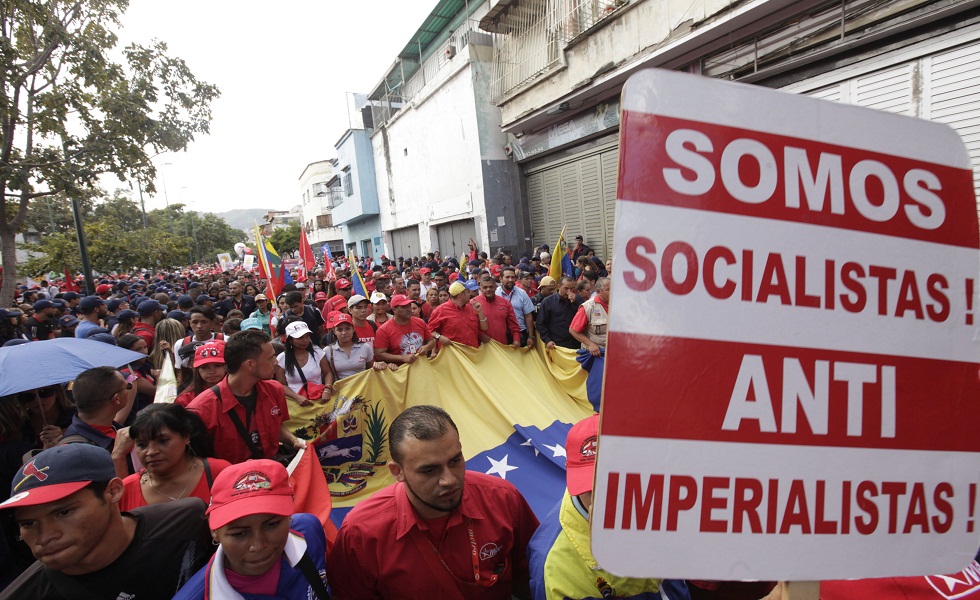
We are socialists! Anti-Imperialists!
Imperialist machinations against Venezuela’s Bolivarian Revolution have continued into Trump’s presidency. At the end of February a bill providing for stronger US action against Venezuela was unanimously passed by the US Senate and is now before Congress. The bill supports moves by the leader of the Organisation of American States (OAS) to invoke its so-called ‘democratic charter’ to suspend Venezuela’s membership and to justify further intervention, isolation and sanctions. Pushed by Senator Marco Rubio, a hard-line Cuban-American, the aim is to remove Venezuelan President Nicolas Maduro and the ruling United Socialist Party (PSUV) from office. Buoyed by US support, OAS Secretary General Luis Almagro issued a further ultimatum, demanding Venezuela hold immediate presidential elections or face suspension from the OAS. Presidential elections are not due until 2018 and the opposition’s attempt to launch a recall referendum last year was stalled by delays and fraudulent signatures. According to Venezuela’s constitution, now that Maduro has served over half his term, a recall referendum would only allow for the Vice President to complete the four-year term.Sam Mcgill reports.
The OAS manoeuvre is politically motivated. Since the victory of socialist president Hugo Chavez in 1998, Venezuela has held 20 elections and referendums. This is in addition to an explosion of participatory democracy through the creation of neighbourhood communal councils and communes. There is clearly no deficit of democracy in Venezuela. Meanwhile, constitutional coups have been carried out in Paraguay, Honduras and Brazil in the last decade, with elected presidents forced out of power to be replaced by unelected right-wing politicians amidst mass protests. None of these countries faced suspension from the OAS. Socialist Cuba, on the other hand was banned for decades. The OAS remains an instrument for the US to impose a neoliberal agenda on its Latin American ‘backyard’
Before handing over the US presidency, Obama renewed an executive order declaring Venezuela a threat to US national security. Continuing on the same track, the Trump administration has imposed a travel ban and sanctions on Venezuelan Vice-President Tareck El Aissami, following accusations of narco-trafficking. So far, no evidence has been released and no investigations opened. In a letter to the US treasury department, published in the New York Times on 23 February, El Aissami hit back: ‘You should be aware that when I headed the public security corps of my country, in 2008-2012, our fight against drug cartels achieved the greatest progress in our history… During those years, the Venezuelan anti-drug enforcement authorities under my leadership captured, arrested and brought 102 heads of criminal drug trafficking organisations not only to Venezuelan justice but also to the justice of other countries where they were wanted. From these 102 captured drug lords, 21 were promptly deported to the USA and 36 to Colombia… Between 2005 and 2013, the seizure of drugs by the Venezuelan authorities averaged 56.61 tons per year, which is a far higher figure than the 34.94 tons per year averaged in the six preceding years, when the US Drug Enforcement Agency (DEA) was operating in Venezuela… In addition, Venezuela has always been recognised by the United Nations as a territory free of drug production’. El Aissami goes on to point out that he does not own any assets or accounts in the US so there are no accounts to freeze. Instead the accusation is designed to criminalise Venezuela and garner support for diplomatic isolation.
El Aissami is not the first to face such allegations. In 2015, then National Assembly president and Socialist Party legislator Diosdado Cabello was accused of heading a drug cartel, while last year, Interior Minister Nestor Reverol was accused of accepting bribes from narco-traffickers. Again, no evidence is provided in either case. Whilst corruption is undoubtedly a problem in Venezuela, the current slander is simply the latest attempt by the US to throw mud in the hope that some of it sticks.
Despite constant attempts to isolate Venezuela, President Maduro and the PSUV have maintained strong regional support. In March Venezuela was unanimously selected to preside over the influential Association of Caribbean States, which consists of 25 full members and 12 associate members. Quashing attempts by neoliberal governments in Brazil, Argentina and Paraguay to suspend Venezuela from the MERCOSUR trading block, its legislative body PARLASUR (the Parliament of the South) rejected the suspension, granting full rights and responsibilities to the member state. Meanwhile the 14th Summit of ALBA condemned the recent US sanctions. The anti-imperialist initiative was founded by Cuba and Venezuela in 2005 to promote mutual co-operation and development. It resolved: ‘The defence of Venezuela and its revolution is not the exclusive problem of Venezuelans. It is the cause that brings together all of us who fight for the true independence of Latin America and the Caribbean,’ Responding to intensified state racism under the Trump administration, the alliance also resolved to re-launch a Migrant Legal Support and Advisory Fund, financed by the ALBA bank.
In the face of continued economic crisis Venezuela continues to make gains worth defending. In February the housing mission completed the construction of 1.5 million units of social housing, the target is to reach 3 million by 2019. Local committees for supply and production now distribute basic goods to over 5,700,000 families with a goal of covering six million households by the end of March 2017. Some 10,000 committees have been operating nationwide over the last year, bringing together community activists and representatives from the Ministry of Food to supply working class neighbourhoods, bypassing private supermarket chains. This queue-busting drive to combat scarcity is also boosting national production. Domestic fisheries have agreed to provide 150 tonnes of canned sardines a day to the local committees, whilst the PDVSA state oil company in partnership with private company Gavenplast will produce an additional one million cylinders each year for direct distribution to households. Despite all obstacles, the struggle for socialism in Venezuela continues.




